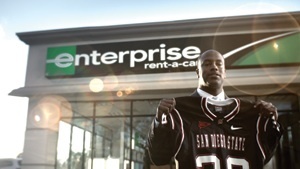Molly Fletcher's Blog, page 23
May 7, 2015
What My Frequent Flyer Points Say About My Parenting
As a parent of three young kids who travels almost every week, I love Mother’s Day because I’m usually home. Parents like me know that as the frequent flyer points rack up, so can guilt. How do you keep from going there?
Kids love stories, and the story of my airline points is one of inspiration. I want them to grow to pursue their unique passions and own their decisions. They are the heroes and audience for my stories as a traveling mom, and this might surprise you: my kids are the ones who benefit the most by my absence.
Without me traveling, they wouldn’t understand the stories they most need to hear their mom tell.
A personal itinerary
I’ve lost track of the thousands of miles I’ve flown since 1996, when I took my first business flight from Atlanta to Orlando for baseball’s spring training. The first big chunk of miles came as I built my career as a sports agent; the second as I pursue my passion as a speaker.
My kids have seen me work to integrate my career and home life. It wasn’t an either-or for me and it shouldn’t be for them, either. It’s “having it all” as I define it and not letting anyone else’s expectations interfere. This is what balance looks like for me. That’s what I want for them.
Changing planes
Life isn’t a straight line from Point A to Point B. My kids were born when I worked for a big firm and answered to many others. Now I run my own business. My points piled up as I followed my heart.
Sometimes that heart feeling made me change my flight pattern. I was in Miami on the second night of a work trip, preparing to head to Tulsa. I would connect through my hometown Atlanta for an hour. But I felt an urge to see my daughters, so I switched to an earlier flight. The spontaneity turned into a fun day pulling the girls out of school early for a surprise lunch, ice cream and bonding. As I went to sleep that night in Tulsa, my heart was full.
Fringe benefits
The points flow back to my kids in the form of special trips like going to the Rose Bowl. They’ve had a great time with relatives who flew in from Puerto Rico, compliments of my Delta SkyMiles.
Points have bought me family time, because I’ve cashed them in to hop on an earlier flight home. They’ve built goodwill for those who keep us going, too: I’ve traded points for small tokens of appreciation.
At their age, my kids don’t see the people who are touched when I travel. My work is to inspire people to live fully. Guilt sabotages personal development, and I work to help my audience shift thinking from “I should” to “ I can” and “I will.”
That can’t be measured in points.
Face time is everything
I travel because in my work, there’s no substitute for face time. Because I am gone so often, my family also places great value in face time. When we are together, we play sports and games and have special mother-daughter dates.
What my points don’t show are the many times I have declined opportunities– to attend the Super Bowl or fly across the world to speak, because my family’s schedule was more important. The balance of points doesn’t show the decisions made for greatest work-life balance.
Life gives our kids so many ways of making connections. As great as it is to cut out the distance through technology, the truest connection is made in person. My points represent that value: I go to make my most authentic connection with my clients, and I return fully present to my family.
Mom battery fully charged
Travel and work energizes me, and when I return from a trip, I am more focused and present than had I been home. The space gives me concentrated alone time to do my best thinking. Instead of serving others in my household, I have some moments of being served. These acts of grace do wonders for my spirit.
When I walk back into the house, I see myself as a slightly better wife and mother because I have worked with great intention to fulfill my life’s work. In that space, my children have learned to become more independent, and I feel the immense gratitude for a partnership with my husband that is filled with unconditional love and support.
I have moments of guilt like everyone, but in those moments I see choice. I choose to embrace the positives.
Sometimes guilt can come when we don’t see the freedom to choose. My points show my choices for work-life balance, and important lessons that my children hopefully will carry into their most important decisions—especially if they choose to be working parents who travel.
Molly Fletcher helps inspire and equip game changers to lead well and with purpose. A keynote speaker and author, Molly draws on her decades of experiences working with elite athletes and coaches as a sports agent, and applies them to the business world. You can follow her on Twitter @MollyFletcher .
The post What My Frequent Flyer Points Say About My Parenting appeared first on Molly Fletcher.
May 5, 2015
Don’t Underestimate the “Power of Why” in Negotiation
There is a saying I heard one time, that “you lose your way when you lose your why.” When our why is our anchor, our path becomes clearer and our decisions easier. I can think of no better example of this than my friend Ernie Johnson, Jr. Most of you know him as “EJ,” the host of NBA on TNT’s pre-game show, but his story is so much more than that. His TNT colleague Charles Barkley put it best, calling him a man of “uncommon courage and a pure heart.”
For 15 years as a sports agent, I negotiated contracts for a lot of athletes, coaches and broadcasters. None was easier to negotiate on behalf of than Ernie Johnson, Jr. Here’s an excerpt from A Winner’s Guide to Negotiating that shows the power of anchoring negotiations against our “why.”
The inner baseline
The relationship with EJ points out another aspect of Setting the Stage: as I try to find the baseline for my client’s value, I’m also looking to understand the values inside him or her. I want to know what beyond money or status—the obvious elements—will make my client at the very least satisfied. More than that, I want him or her to be blown away. Grasping these values gives us more choices, and more choices always create a better platform for negotiation.
I know what a good salary does for EJ. When I meet him for lunch, his severely disabled son Michael joins us. Michael uses a wheelchair, and a good salary for EJ means Michael uses a great wheelchair. EJ is great at what he does, and what is at stake for him is taking care of his family, and the wheelchair is a big part of that. Each week EJ goes to the grocery store and always stops to buy a bouquet for Cheryl (his wife), and always buys an extra bouquet. As he leaves the store, he looks for the right stranger to give those flowers to. Who knows how many regular folks have been blessed by EJ’s flowers? There’s no telling, but these bouquets bring him so much joy. As his agent, I look for these details. These are part of his inner baseline. Take away his ability to get the wheelchair or buy the flowers—which granted, may not be a lot in terms of dollars—and his life has a lot less joy.
As I do my homework and Set the Stage for negotiating, I want to know as much as I can about the side I am representing. I want to know what makes up my client’s inner baseline. I have my own inner baseline too. Because EJ’s values align so closely with my own, I love being a part of his negotiations. Ensuring a fair salary and compensation for him is fun for me. I know he’s not going to go sideways for a couple extra thousand dollars. Sure, I can help a client who I know is going to spend his paycheck on strip clubs and fancy purses, but I have a greater heart for EJ and the clients whose drive is to do well in the world. When he wins the John Wooden Keys to Life Award, given to individuals who live out faith, integrity and character, I’m beyond thrilled. His professional platform is all about him being a great role model in life. I know that his heart is not about the money but the message, and we stayed clear on that from the front end and consistent throughout the contract negotiation.
Your Game Changer Takeaway
Anchor your asks in life against your why. Negotiation is often a long process, filled with doubt and uncertainty. We have to be able to tap into our motivation for why we are making the ask. What’s really driving it? If you can get clear on the why, you’ll find the courage to ask with confidence.
Molly Fletcher helps inspire and equip game changers to lead well and with purpose. A keynote speaker and author , Molly draws on her decades of experiences working with elite athletes and coaches as a sports agent, and applies them to the business world. Sign up here to receive our monthly newsletter.
The post Don’t Underestimate the “Power of Why” in Negotiation appeared first on Molly Fletcher.
April 27, 2015
7 Essential Ways to Manage Energy
Setting a goal almost always  sets up a gut check—that moment when the small urgencies of life threaten your energy and progress. It’s a make or break turning point that may require sacrifice and doubling down on your determination.
sets up a gut check—that moment when the small urgencies of life threaten your energy and progress. It’s a make or break turning point that may require sacrifice and doubling down on your determination.
Those energy drains are why I found the book Essentialism so relevant. Author Greg McKeown does a beautiful job of delivering his subtitle, “The Disciplined Pursuit of Less.” It helps you map your journey without getting sidetracked, by shedding the distractions that keep you from being your best self.
The following are my personal seven top points from Essentialism to manage energy and find more fulfillment.
Three core truths: I decide for myself. Only a few things really matter. I can do anything—but not everything.
Priority is singular. This word came into our language back in the 1400s; five hundred years later, we started making it plural. By multiplying the idea of what is important, we divided our energy among the many instead of the few.
Choose to empower yourself. This is each of ours until we don’t exercise it. When we fail to deliberately select to focus ourselves, other people choose for us, and that’s a detour from what is most meaningful.
Tradeoffs are inescapable. This is much easier when the criteria is selective and explicit—this is the filter of essentialism. Trade a long laundry list of ‘accomplishments’ that don’t really matter for a career of select achievements that have real meaning and significance. You must decide what is most important, and this priority is a one-time decision that cuts through the noise and helps make a thousand future decisions.
Eliminating the “trivial many.” Think about the last time you agreed to take on a time-consuming task. What did you have to give up (time and more) to fulfill this promise? By considering this cost, it is easier to say no in the future and focus on your priority.
Go for the small wins. A small, simple win in an area that is essential will create great momentum. Progress breeds motivation. For me, a small win is staying physically active; it is a ritual that is meaningful and key to sustaining my energy. Remember that small, meaningful goals are their own reward, and lead to greater fulfillment than setting goals that may be too lofty or impossible.
Remember WIN. “ What’s important now?” Those three words can gently and clearly pull you back to the track you need to stay on.
Your Game Changer Takeaway
More isn’t better. It puts you on a hamster wheel of expectations. Nobody can do everything. Energy management is critical, and you can boost your energy by shifting your focus from getting more done to getting done what’s right.
Spend some time brainstorming what better would look like. What trivial pursuits and time wasters can you shed to turn your focus to what’s right? This critical thinking can help you find more clarity and joy as well as energy.
It takes guts to make tough decisions regarding priority, but it’s liberating. Finding your “essentialism” allows for the blossoming of your most meaningful relationships and activities. It’s the best alternative to the stress of an endless to-do list.
Molly Fletcher helps inspire and equip game changers to lead well and with purpose. A keynote speaker and author , Molly draws on her decades of experiences working with elite athletes and coaches as a sports agent, and applies them to the business world. Sign up here to receive our monthly newsletter.
The post 7 Essential Ways to Manage Energy appeared first on Molly Fletcher.
April 20, 2015
One Golden Tip for Better Work-Life Balance
My golden tip for balancing work  and personal life came as a crisis was brewing my first year in college. It came from the person who has been my role model for the longest time, who saw my imbalance well before I did.
and personal life came as a crisis was brewing my first year in college. It came from the person who has been my role model for the longest time, who saw my imbalance well before I did.
These wise words helped ground me as I built a successful business, got married and had kids. This golden tip is particularly important for millennials, for whom work-life balance is critical.
Doing everything during the first college term
As a new student, I immersed myself into everything Michigan State had to offer. I played tennis, rushed a sorority and studied, pretty much in that order. At the end of the term, I was bubbling over when I went home. My parents’ house, where I had grown up, was all of two miles from campus.
Standing in the entryway, I excitedly told my mom how much fun I was having with the girls in my sorority and how great I was hitting the tennis ball.
“Wow, sounds great, Molly,” my mom said, casually. “Sounds like you have it all. Can you have it all at once?”
I bounced back to campus, where her words echoed loud and strong a few weeks later. My first term ended with a 1.8 grade-point average.
It was embarrassing and humbling. I could not fully join my sorority and was on the edge of being ineligible to compete in tennis. Trying to have it all had compromised my central purpose: to get a great education.
I was way out of balance.
Finding the sweet spot
Rebounding was up to me—that much was clear by the way my parents treated me. They didn’t punish or reprimand me. They didn’t make it their issue. The grades spoke louder than they could. Their message was simple: “You’re better than that.”
I quickly determined to fix the mess as quickly as possible. I doubled down on studying and came to know the library as my great friend.
For the next seven terms, I aced my classes, a 4.0 every term. Quickly my GPA jumped and soon it was well above 3.5. Better grades meant I no longer had to worry about tennis or social opportunities. I had options and greater balance.
The Golden Tip
“Can you have it all at once?”
That question still rings for me. I’m so grateful for my mom’s comment. It led me to my understanding of work-life balance. Today my answer is, “You can have it all, but not all at once.”
As you’re starting out building your career and personal life, there will be imbalance.
Early in my career as a sports agent, I worked 24/7. For a decade, I said yes—all the time. My clients didn’t know what my voice mail sounded like. This was what was required to outwork the competition. A rock-solid foundation like that gives you options.
When I married and had children at 32, I had much more ability to say no. I had more clarity on what I did well, what I could delegate and whose call I absolutely needed to take. Clarity leads to balance, and helps you see more options. (This is true for many of my best college friends, who gather every fall for a girls’ weekend—maintaining our deep friendships is part of our work-life balance.)
Today I can say with gratitude that my wants and needs are in equilibrium. This would not have been possible without recovering from adversity quickly and accepting that finding balance required a ton of hard work. No one can or will give you work-life balance.
Your Game Changer Takeaway
Only you can define your ideal work-life balance and finding that sweet spot requires sacrifice and hard work. Consistent delivery of top service is a great foundation for business success and leads to options for greater work-life balance. As I learned from my mom’s well-timed question in the threshold of my childhood home, you can have it all—just not all at once.
Molly Fletcher helps inspire and equip game changers to lead well and with purpose. A keynote speaker and author , Molly draws on her decades of experiences working with elite athletes and coaches as a sports agent, and applies them to the business world. Sign up here to receive our monthly newsletter.
April 13, 2015
Millennial Women: Make Each Day Equal Pay Day
April 14 is Equal Pay Day,  highlighting a disturbing issue for millennial women in particular. A reported 60 percent of them are not negotiating for better salary or benefits.
highlighting a disturbing issue for millennial women in particular. A reported 60 percent of them are not negotiating for better salary or benefits.
It doesn’t have to be this way. Negotiation is the prime way that women of any age can make each day Equal Pay Day. For millennial women, negotiating is a critical skill for achieving autonomy and flexibility—two values particularly important to this generation.
Negotiating a First Job Offer
As a young adult trying to break into the tough world of sports representation, I had to negotiate to survive. Creativity is an asset, and I negotiated free rent from an Atlanta apartment complex in exchange for tennis lessons. That gave me some confidence to keep knocking on doors for a job as my money was running out.
I desperately wanted to work at Super Bowl XXVIII in Atlanta. Probably none of the NFL players aiming for the game were any more pumped as I was to be part of this event. I had applied for an office job, which meant answering the phone 400 times a day for the event chairman, former Atlanta Falcons coach Leeman Bennett. Here’s how the offer went down.
“We’ll pay you $600 a month,” Bennett said, “and you’ll start next week.”
“OK,” I replied, eager to get started with my dream of working in sports.
Then the reality check set in. It may sound funny, but I had been so focused on getting the job that the pay had been secondary (sound familiar?). In my excitement, I’d accepted the job offer without hesitation.
When I called Bennett back, I knew enough not to whine that $600 wasn’t enough to live on. I was smart enough to make a new offer.
“That $600 salary you mentioned,” I said. “That’s per week, right?”
It was a pretty good try for a kid like me, but I knew I had given up any leverage with my quick initial acceptance. We stayed at the original terms and it was a valuable lesson for me that I wouldn’t soon forget.
Lesson Learned: #ask4more
The story makes me smile today because picking up the phone and going to bat for myself was incredibly important rehearsal for the calls I would make later in my career as a sports agent on behalf of professional athletes, coaches, announcers—and myself.
You have to have a kernel of belief in yourself to make the ask; you become confident with more experience and success, which comes with practice. It’s even possible that you discover that negotiations can be fun and not a grind, and set you apart from your peers.
Only 21 percent of respondents in a Levo survey say they negotiated their first job offer, and you’re leaving a lot of money on the table if you skip this step. A 2014 Wells Fargo study showed that the household income reported by millennial men averaged $77,000 compared with $56,000 for women—even though millennial women are graduating from college at a higher rate and that this starting point is when we should see the narrowest gap.
As Levo CEO and co-founder Caroline Ghosn pointed out, millennial women who do not push for equal pay will experience the loss of more than $461,000 in average household income over our lifetimes. That is a conservative estimate; other experts say that gap can grow to $1 million.
Your Game Changer Takeaway
A job offer represents a starting point for your creativity. Negotiation is about offering choices that represent gains for both sides. No matter how many times you have seen friends struggle to get jobs, even jobs that are below their education levels, you can still negotiate.
Negotiation skills are as important, maybe more so, than a warm and friendly demeanor that many women are expected to project. Firm assertiveness is a leadership quality that will set you apart. Practicing #ask4more now will pay dividends through the span of your career and to the next generations.
Molly Fletcher is a popular keynote speaker and author of the book, “ A Winner’s Guide to Negotiating: How Conversation Gets Deals Done ” (McGraw-Hill, 2014). She draws on her decades as a sports agent and negotiator on behalf of pro athletes, coaches and broadcasters to equip readers with the skills to negotiate effectively. Follow Molly on Twitter @MollyFletcher.
April 6, 2015
Bubba Watson’s Example Can Help You Develop Authentic Leadership
Bubba Watson was in  college when he taught me a lesson that I’ll never forget: First impressions don’t always foretell who is going to perform well. The most authentic leaders are focused on what only they can do and are immune to the judgment of others.
college when he taught me a lesson that I’ll never forget: First impressions don’t always foretell who is going to perform well. The most authentic leaders are focused on what only they can do and are immune to the judgment of others.
I was at the outstanding golf facility at the University of Georgia, scouting his high-profile teammate, Ryuji Imada. Many agents were trying to get to know Ryuji; Bubba was known as his teammate with the unorthodox, self-taught swing and the kind of nickname that you don’t hear often inside the ropes of a major tournament.
Ryuji had come up through the superstar pipeline, relocating from Japan to Tampa when he was a teenager to work on his game, and he was projected to do magical things on the PGA Tour. He was kind of a quiet guy, skeptical. The team would go on to win the 1999 NCAA Championship, and the Georgia coach, Chris Haack, was thrilled to show me the new Boyd Center, the team’s clubhouse. Haack even knocked on the men’s locker room door.
“Ya,” a voice answered behind the door.
“You decent?” Haack replied. “I want to bring a female in to show her around.”
“Ya,” the voice replied.
As we rounded the row of lockers, I saw a player in the corner, facing away from us and working to re-grip his club.
“Who is that?” I asked.
“Bubba Watson,” Haack said.
Bubba showed no interest in talking to an agent or doing anything besides the task at hand—fixing his club. It was an easy call to pursue Ryuji, who we signed and who went on to a career year in 2008 with a top-20 season finish with $3 million in winnings and tournament victory.
Success Bubba Style
And we all know what Bubba did. That swing honed from years of hitting whiffle balls won the Masters twice; this week he defends his title. He has four top-5 finishes this season and ranks fifth on the money list.
Almost no one would have seen that kind of success that day he was re-gripping his club. Maybe not even Bubba. What attracts people to him, and I believe why he wins big, is that he is not afraid to be his authentic self, and lead with confidence when the most pressure is on.
Stepping up in the spotlight, and performing in the clutch to win at the level of the Masters, takes ownership of exactly who you are and what you have to offer, and what you can do in a high-pressure situation. In short, leaders and high performers must believe in what they bring to that moment, and not compare themselves to others or try to impress anyone. They have the courage to do what only they can do in that situation, and this is a mindset more than a skill set.
“It’s never been about ability for me,” he told USA Today this week. “It’s about my mind. If I get my mind in the right place, there’s not a shot I can’t hit. There’s not a golf course that can beat me. It’s about having the right focus, the right energy level. It’s all that wrapped into one for me. All of mine are mental issues.”
I didn’t get Bubba back in college, but he knew where he was going. He still does. That’s authentic leadership.
Your Game Changer Takeaway
Pro golfer Bubba Watson is a great example of a fearless, authentic leader who isn’t afraid to get a pie in his face on TV. He has won two Masters because he has a strong sense of self and balance from those around him. These help him recover quickly from adversity and lead boldly in moments of opportunity. You don’t have to copy a famous leader to lead famously. Be yourself.
Molly Fletcher helps inspire and equip game changers to lead well and with purpose. Her book, “ A Winner’s Guide to Negotiating: How Conversation Gets Deals Done ” (McGraw-Hill, 2014), draws on her decades as a sports agent and negotiator on behalf of pro athletes, coaches and broadcasters. Sign up here for our newsletter.
April 2, 2015
How Hiring Student-Athletes Will Spark Your Corporate Team Chemistry
The reasons we love  watching college athletes compete are what makes them great employees. These young men and women represent a deep talent pool to check out especially if the chemistry of your corporate team could use a boost.
watching college athletes compete are what makes them great employees. These young men and women represent a deep talent pool to check out especially if the chemistry of your corporate team could use a boost.
Competing on such a high level requires they work well with others in tense situations , make decisions and solve problems to help their group advance to a goal. At Enterprise, a leading recruiter of college graduates, a student athlete represents an employee “who can pull the trigger and make a decision,” said the company’s vice president for talent acquisition Marie Antrim.
They are more self-reliant and aware of what they can contribute to better the team. “Sports provide the foundation to have discipline and be a self-starter while overcoming adversity,” said Jed Hughes, vice chairman of Korn/Ferry International, an executive search firm with offices in 40 countries.
They are driven (some literally). Student-athletes are wired and/or trained to max out their talent and opportunity. (Read this story about a Xavier basketball player who discovered great personal benefit by driving for the car-sharing service Uber.)
They are resilient and can leverage that skill to advance themselves and their teams . This is particularly true for female student-athletes. More than 50 percent of female executives played college sports. See more details of why this is at this great infographic from EY.
For all the above reasons and more, they have superstar potential. Some examples of CEOS who played college sports include Jeffrey Immelt (GE, Dartmouth football), Walter Robb (Whole Foods, Stanford soccer) and Lynn Laverty Elsenhans (Sunoco, Rice basketball).
Your Game Changer Takeaway
Because of their sports training, student-athletes typically are ahead of their peers in leadership development, energy management and personal goal setting related to their careers. Only a small fraction of them go on to play professional sports, which means there’s a lot of talent ready to compete for your corporate team. Why not spark your team chemistry by hiring a student-athlete?
Molly Fletcher, a varsity tennis player at Michigan State, applies skills from the sports world to inspire and equip business leaders and teams to achieve peak performance. Her book, “ A Winner’s Guide to Negotiating: How Conversation Gets Deals Done ” (McGraw-Hill, 2014), draws on her decades as a sports agent and negotiator on behalf of pro athletes, coaches and broadcasters. Follow Molly on Twitter @MollyFletcher.
March 23, 2015
5 Characteristics of Successful Teams
If you’re one of the 60 million Americans following March Madness wondering exactly what makes the 16 remaining teams peak right now—and what will inspire your corporate team or family—keep reading.
Americans following March Madness wondering exactly what makes the 16 remaining teams peak right now—and what will inspire your corporate team or family—keep reading.
The following are five essential things that successful teams in the NCAA Sweet 16 demonstrate, and any team that does these five things will position itself for high performance.
1. Focus only on things they can control.
Average teams get distracted. Not these teams. The Princeton women’s basketball team is undefeated, joining Kentucky men’s basketball as the only undefeated team in the tournament. Princeton’s rank coming into the tournament: 13th in the country. Tournament seed: 8. The Tigers had to let that go, along with a bunch of other distractions: midterm exams, senior theses, and even President Obama showing up for the first-round game. Princeton won that one, and will have a tough test coming up tonight against top seeded Maryland.
2. Hold each other accountable.
Average teams rely on the coach to keep tabs on their behavior. Not these teams. picked one another up at a critical point near the end of regulation against Butler. Forward Zach Auguste committed two turnovers in the final minutes, and in his despair, fellow forward Pat Connaughton took initiative to refocus him. Demetrius Jackson was also in high emotion during the next timeout and teammates Connaughton and Jerian Grant calmed him down. Never once was it the coach who had to set the tone. Connaughton ended up blocking Butler’s 3-point attempt as time expired in regulation. Notre Dame won in overtime because its players held each other accountable. The coach did not have to take control; they did.
3. Recover quickly from adversity.
Average teams shrink when things go bad. Not these teams. The N.C. State men’s team came in with a streaky record, so it wasn’t surprising to see the Wolfpack trail LSU by more than 15 points in its opening round game. They hung tough, and they were never ahead in the second half until the last-second shot gave them a 66-65 victory. They then knocked off top seed Villanova to advance to the Sweet Sixteen.
Another example: Michigan State. A few weeks ago, the Spartans weren’t sure they would make it to their 18th straight NCAA tournament, because their regular season performance was spotty. They rebooted to beat Georgia and second-ranked Virginia.
4. Embrace Pressure.
Average teams crumble under pressure. Not the Connecticut’s women’s basketball team. They have made the last six Final Fours and taken home four national titles. They appear indomitable because at their very core, they love pressure. Every game is a chance for another team to knock them off, and their opponents have nothing to lose. “We love the fact that we’re expected to win every single game,” Auriemma said. “Beating us gets you on TV.” Every game for UConn is a test of whether they can remain on top, and they thrive in that space.
5. Demonstrate Selflessness.
Average teams have players who focus on themselves. The undefeated Kentucky’s men’s basketball team is the opposite. Ten players average more than ten minutes a game; none plays more than 26 minutes a game on average. Coach John Calipari has persuaded his roster of great athletes, who have heard accolades their entire lives, to sacrifice personal stats for the good of the team. ““Instead of me, me, me—it’s us, us, us,” he said. They are also one of (if not the) best defensive teams in the country. If they win the title, the Wildcats will become the first undefeated champion in 40 years.
Your Game Changer Takeaway
The five habits of successful Teams in the NCAA Sweet 16 create a chemistry that leverages personal choice to create a bond of trust. The ones that make it to the Final Four will have that extra edge from this synergy of focus, accountability, quick recovery, love of pressure and selflessness. For greater success, integrate one or all of these practices in your team.
Molly Fletcher helps inspire and equip game changers to lead well and with purpose. Her book, “
A Winner’s Guide to Negotiating: How Conversation Gets Deals Done
” (McGraw-Hill, 2014), draws on her decades as a sports agent and negotiator on behalf of pro athletes, coaches and broadcasters. Follow Molly on Twitter @MollyFletcher.
March 16, 2015
At TED, Truth + Dare = Inspirational Message
There will be plenty  of inspirational messages this week at the TED Conference in Vancouver, billed as where “thinkers, dreamers and mavericks will talk about the world and what’s coming next.”
of inspirational messages this week at the TED Conference in Vancouver, billed as where “thinkers, dreamers and mavericks will talk about the world and what’s coming next.”
TED’s 18-minute format forces speakers to hone in on the heart of the message they most want to convey. Arguably, if the speakers went longer they might not be as powerful. The limited format requires them to distill and simplify.
Truth and Dare
I love the conference theme, “Truth and Dare.” Those words sum up what an inspirational message is about: honesty and vulnerability. There is no authenticity without those elements. TED content director Kelly Stoetzel explained that “Truth and Dare” relates to deep wisdom and the courage to challenge traditional ways of thinking.
“To me, ‘truth’ is about people sharing a deep truth that they’ve delved into in their work or research,” she said. “Then the ‘dare’ part is including people who are right on the edge of something brave: they’re innovating in a smart way; they’re doing something that’s not business as usual; they’re challenging conventional wisdom.”
The truth of new research can dare people and teams to take risks and win big. One talk that I look forward to hearing is by Rajiv Maheswaran, who is using advanced data analysis tools to help make basketball teams smarter. The promo to his talk notes that “in the world of North American sports, baseball and football fans are obsessed with stats about player performance and game-day physics. But basketball, a much more fluid and fast-moving game, has been harder to understand through numbers. Rajiv Maheswaran is working to change that, by offering pro basketball teams insight into game data to make better decisions.”
Stories Are the Heart of an Inspirational Message
By doing a TEDx presentation, I experienced the 18-minute challenge. I needed to drill down on my most important ideas worth spreading. Within those ideas, what were the most important ones? And when I pinpointed those, the question became, “How can I get that message across?”
That’s why stories are particularly common in TED– the speaker has to find the most expedient means of getting his or her point across while connecting with audience in short time frame. The pace of TED talks usually are fairly rapid, because time is of the essence. That’s something any speaker should keep in mind, because an audience’s time and attention is precious.
TED proves that an inspirational message doesn’t have to be super long. In 18 minutes, you can change the world.
Your Game Changer Takeaway
TED talks are shared free online, so all of us can look for the next great inspirational message. This week, look and listen for talks from Vancouver on the topic of “Truth and Dare.” I expect to be dared to keep digging for the essence of my next inspirational message.
What was your favorite 2015 TED conference speaker? Let me know!
Molly Fletcher helps inspire and equip game changers to lead well and with purpose. Her book, “ A Winner’s Guide to Negotiating: How Conversation Gets Deals Done ” (McGraw-Hill, 2014), draws on her decades as a sports agent and negotiator on behalf of pro athletes, coaches and broadcasters. Follow Molly on Twitter @MollyFletcher.
March 10, 2015
Here’s How a Female Motivational Speaker Makes it Happen
To celebrate March  as Women’s History Month, and because #makeithappen is so energizing, this blog will break down the secrets of how a female motivational speaker can inspire and lead as only she can. Any manager or team member—male or female—can inspire others to their greater potential by using these tips to prepare well and connect with your audience.
as Women’s History Month, and because #makeithappen is so energizing, this blog will break down the secrets of how a female motivational speaker can inspire and lead as only she can. Any manager or team member—male or female—can inspire others to their greater potential by using these tips to prepare well and connect with your audience.
Two Secrets to a Great Speech
I prepare for a speech the way that I prepare to negotiate: with great preparation and understanding of my audience. These two steps help build a memorable connection with the audience.
1. Set the stage with great preparation.
An invitation to speak is like a visa to visit a new country. To thrive there, you must understand the people, language and customs. You must do your homework to know your audience’s stress points—where they most need support, where they have the most at stake, where their greatest benefit can come from the simplest change. Achieving this level of understanding is what I call “360 Degree Awareness”—your vision extends into what is important to your audience.
This data helps pinpoint your most valuable message. Zoom in on what your listeners most want and what they most fear, and tailor your talk to those internal forces.
2. Find common ground with your audience.
No matter how well you know your audience, there is a common enemy to a successful speech. Fear is the reason most people feel more comfortable listening than speaking publicly. It’s easier to imagine bombing than succeeding. It’s easy to let the “what if’s” take over.
Fear evaporates when you find common ground with your audience. It’s not you vs. them; you are both on the same side. The audience has three issues with any speaker: Do I like you? Can you help me? Do I trust you? One great way to answer in the affirmative is through stories that establish your authority and understanding of what your audience is up against. When your audience can see that you have a clear picture of their struggles, and you can offer concrete steps to help them succeed, that’s a powerful connection.
Through empathy, a speaker often can invite an audience to connect deeply to her message. Any speaker increases confidence by knowing that the audience will benefit from what she or he has to say. The message is about them, not you.
Your Game Changer Takeaway
To successfully motivate others, you don’t have to speak to hundreds of people. A female motivational speaker knows that her actions speak the loudest. She must demonstrate that she cares through nonverbal cues as well as her words. The successful female motivational speaker draws from the same source as any other high achiever: a deep well of passion. As Helene Gayle, the inspiring leader of CARE points out, great passion will lead you to huge impact—no matter where you speak from or who you speak to.
Molly Fletcher helps inspire and equip game changers to lead well and with purpose. Her book, “ A Winner’s Guide to Negotiating: How Conversation Gets Deals Done ” (McGraw-Hill, 2014), draws on her decades as a sports agent and negotiator on behalf of pro athletes, coaches and broadcasters. Sign up here for our newsletter.




